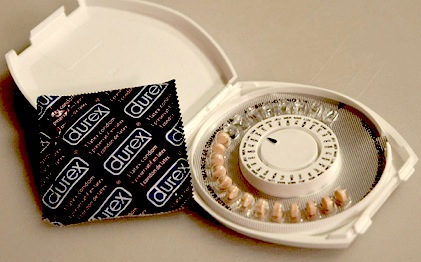This month marks the 50th anniversary of the Pill, and there’s been some interesting coverage of it by the media. Margaret Marsh, one of the first researchers granted access to the personal letters of the Pill’s co-developer, John Rock, discusses his Catholicism, among other Pill tidbits. The Guardian points out that 200 million women still need access to it worldwide. CBS’s Early Show had an insultingly short segment with Gloria Steinem (!) and Hillary Swank (?) — hey, guess that’s better than nothing. Ob/gyn Christiane Northrup goes over the more medical aspects of the Pill on the Huffington Post. One blogger reminds us of the theory that the Pill-induced standard of a monthly period is actually unnatural. And Time’s recent cover article was a nice review of the history of the Pill — that is, until we came to this line:
The 50th Anniversary of The Pill


















I thank every day for the Pill because without it my uterus might have finally taken over and eaten me from the inside out.
Right, Dave. The “Morning After” pill does not cause abortion. Abortion is defined as the interruption and termination of a PREGNANCY. Pregnancy, like you said, does not BEGIN until implantation, which can take place as long as TEN days after the intercourse which set the action in motion.
Plan B prevents ovulation and/or prevents implantation in rare cases, the prevention of ovulation is more common with most users.
I have read if you were ovulating at the very time you took Plan B, you have a better chance of a period within 3 to 5 days of taking Plan B, if you were not ovulating, and the medication simply prevented the ovulation to come (or you already ovulated and did not fertilize the egg) you will get your period at the normal time. I do not know if this is true or not (although I got the information from the insert in a package of Plan B, when it contained TWO pills, now it only has one) but I assume this is true most of the time.
Plan B CANNOT cause an abortion if you are already pregnant, neither can the standard birth control pill. Years ago, doctors used to prescribe 3 or 4 BC pills taken at one time for “morning after” protection. It was used for women who knew to ask for it (most did not) but it’s common usage was for women who presented to the ER after a sexual assault.
Either way, it is not an abortion. RU486 (“the abortion pill”) is a completely different medication, it is not available over the counter, it is ONLY taken after implantation, it is usually given IN the doctor’s office, the woman has to see her doctor or nurse practitioner several days after taking the med to make sure the IMPLANTED fertilized egg was flushed from the body, the side effects are obviously much stronger, and the two medications should not be confused.
Actually, a small percentage of the time, Plan B might prevent a fertilized egg from implanting in the uterine wall. This was the crux of the argument of people who wanted to reclassify it as abortion, and subject it to stricter controls. Of course, the same people probably think of spilling one’s seed upon the ground as a mini-abortion. Most medical professionals consider implantation to be the start of a viable pregnancy. Also, implantation is medically verifiable, whereas fertilization is, um, not.